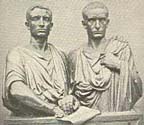By M. Horatius Piscinus
"This essay-cycle concerns the murder of Appuleius Saturninus, and the trial of Rabirius for the crime some 47 years later. It is an interesting tale, its characters well known. Marius, the prosecuting tribune Titus Labienus, the praetor Julius Caesar sitting as judge, Consul Cicero speaking for the defense, Q. Caelius Metellus Celer as the opposing praetor, his wife Clodia, her lover Catullus, her brother P. Clodius Pulcher, all in the few short months leading up to the Catalina episode."
"Every tale should have a clear beginning and a definite end. But this is a tale of a feud. A feud not between two rival political factions, as it is often portrayed, but a family feud lasting over generations."
In 103 BCE the tribunus plebis Appuleius Saturninus passed a series of measures: drastically reducing the price of the monthly corn ration, establishment of new permanent courts to hear cases of maiestas which broadened the definition of what constituted treason (the Lex Appulia will come into play later), and the distribution of land in North Africa to the veterans of Marius Numidia campaign. His colleague, tribunus plebis G. Servilius Glaucia introduced a separate law restoring the Equites to a position where they constituted the permanent tribunals.
In 102 Numidius was censor and tried to have both Saturninus and Glaucia removed from the Senate. The Senatorial Party was opposed to Saturninus' agrarian law that gave land to Marius veterans. Marius had of course first upset them by recruiting the urban poor into his army. The fact that Marius had won the war with this
rabble of sewer scum, where Numidius had failed with an army of Roman gentry, was just too much of an insult to Numidius dignity.
In 100 BCE Saturninus was again elected as Tribunus Plebis, with Glaucia now as Praetor, and Marius was in his sixth consulship. Saturninus proposed a new agrarian bill, giving land to Marius veterans of the Cimbri campaign in Cisalpine Gaul, establishing Latin colonies in Sicily, Macedonia and Achaea, and granting citizenship to those Italians who had sent troops to fight in the German campaigns. By this time the majority of troops in Roman legions were Italians, but not citizens, and Saturninus proposed to correct that.
Saturninus won reelection as tribunus plebis for 99. Glaucia had attempted to run as consul, but the Senate disallowed his candidacy. Disorder broke out. Saturninus arranged for the assassination of G. Memmius who was the Senates candidate for consul. So no elections were being held for the consulship. The Senate made some moves against Saturninus, and Saturninus and Glaucia seized the Capitoline.
The senate passed a senatusconsultum ultima calling on the consuls to restore order. One of the consuls, however, was Gaius Marius. Marius brought his troops into Rome. Ostensibly they were there to quell the riots and seize Saturninus, but also as a reminder to the Senate that it was his veterans who had been promised land, and that his present legionaries expected no less. There is some conflicting reports about Marius role in this affair. The general interpretation is that after being allied with Saturninus so long, Marius withdrew his support because of what appeared to be the excesses of Saturninus that were leading to what Cicero would later call rule by the tribunes. Assured of Marius protection, Saturninus and Glaucia entered the Senate to negotiate a resolution of the situation that would allow an election of the consuls to take place. The Senate locked its doors behind them, and then murdered Saturninus and Glaucia.
 By Ling Ouyang
By Ling Ouyang
 By By John H. Haaren, LL.D. and A. B. Poland, Ph.D.
By By John H. Haaren, LL.D. and A. B. Poland, Ph.D.